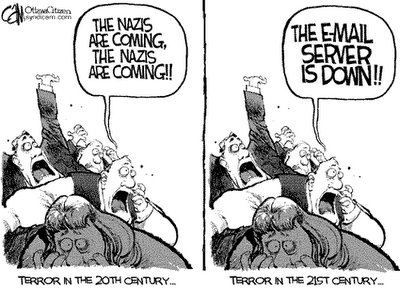
I don't know how much you know about computers, or more importantly data storage, but you should know what a terabyte is by now. If not, you should be ashamed of yourself and immediately ask for forgiveness. If so, continue on with me as we explore the depths of data storage capacity and its mating habits...
How about we start at
kilobytes? Kilobytes are small. For example, the picture on the right is about 6 kilobytes. Puny... nothing.
A
megabyte... we should all know what those are by now. Your average MP3 is about 4 MB. Getting bigger, but still miniscule compared to the things coming.
Gigabyte should be a household name now since most households have computers in them. Your average computer contains a hard drive that has about 100 GB worth of space on it. Personally, I have a 120 GB hard drive and I'm running low. I am thinking of buying a new 320 GB for my file storing pleasure. Also, the creation of
HD DVD (High Definition Digital Video Disc) and the
BD (Blu-ray Disc) will help. Both of these items can hold anywhere between 15 GB to 100GB of data.
We are going to start hearing the word
terabyte more and more in the near future. 1 TB = approximately 1000 GB, so you can imagine how big that is. If that doesn't help, the books in the U.S. Library of Congress have been said to contain approximately 20 terabytes of text. Note that this may be an underestimation. The next generation of optical discs is called
HVD (Holographic Versatile Disc) and they can hold up to 3.9 TB of information. It is my belief that computers will have multi-terabyte hard drives within the next couple decades.
A
petabyte has nothing to do with the animal rights organization (thankfully) nor round flat wheat bread. It is only a step up the storage chain. Reportedly, Google has between 1.8 and 5 petabytes of storage. Also, in Star Trek: The Next Generation, the android Data was built with an ultimate storage capacity of 800 quadrillion bits, or approximately 88 petabytes.
We're starting to get into the rediculous stage when we talk about
exabytes. As of 2005, exabytes of data are almost never encountered in any practical context. For example, the total amount of printed material in the world is estimated to be around five exabytes. I doubt that we will ever see any type of device hold this amount of data in our lifetime.
Above that is a
zettabyte. Although it may sound like a pasta dish, there is nothing that is a zettabyte right now. Once again, this will probably be something that we will barely hear about when we are on our deathbeds.
The highest unit of information known to man right now is the
yottabyte. The YB is equal to one septillion bytes. I didn't even know how much one septillion is, but I found out it is 10^24, or 1,000,000,000,000,000,000,000,000. That is absolutely insane.
This is the future and it's approaching one second at a time. In conclusion, for Christmas, I would like a 1 yottabyte hard drive rack plzkthx.


 I don't know how much you know about computers, or more importantly data storage, but you should know what a terabyte is by now. If not, you should be ashamed of yourself and immediately ask for forgiveness. If so, continue on with me as we explore the depths of data storage capacity and its mating habits...
I don't know how much you know about computers, or more importantly data storage, but you should know what a terabyte is by now. If not, you should be ashamed of yourself and immediately ask for forgiveness. If so, continue on with me as we explore the depths of data storage capacity and its mating habits...